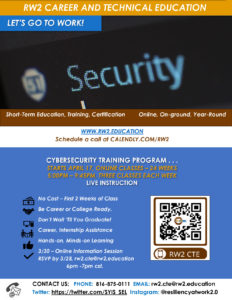As society relies more on the internet for almost everything from work to financial management to data storage, we also depend on cybersecurity experts to protect our privacy while we send and receive data. Cybersecurity is the practice of guarding computers, data, and networks from any kind of damage, loss, theft, or illegal access.
As our interconnectivity escalates, so do the opportunities for hackers to steal, disrupt, or damage. The rise in cybercrime has increased the demand for cybersecurity professionals. Over the next eight years, job opportunities should increase by 35%.




